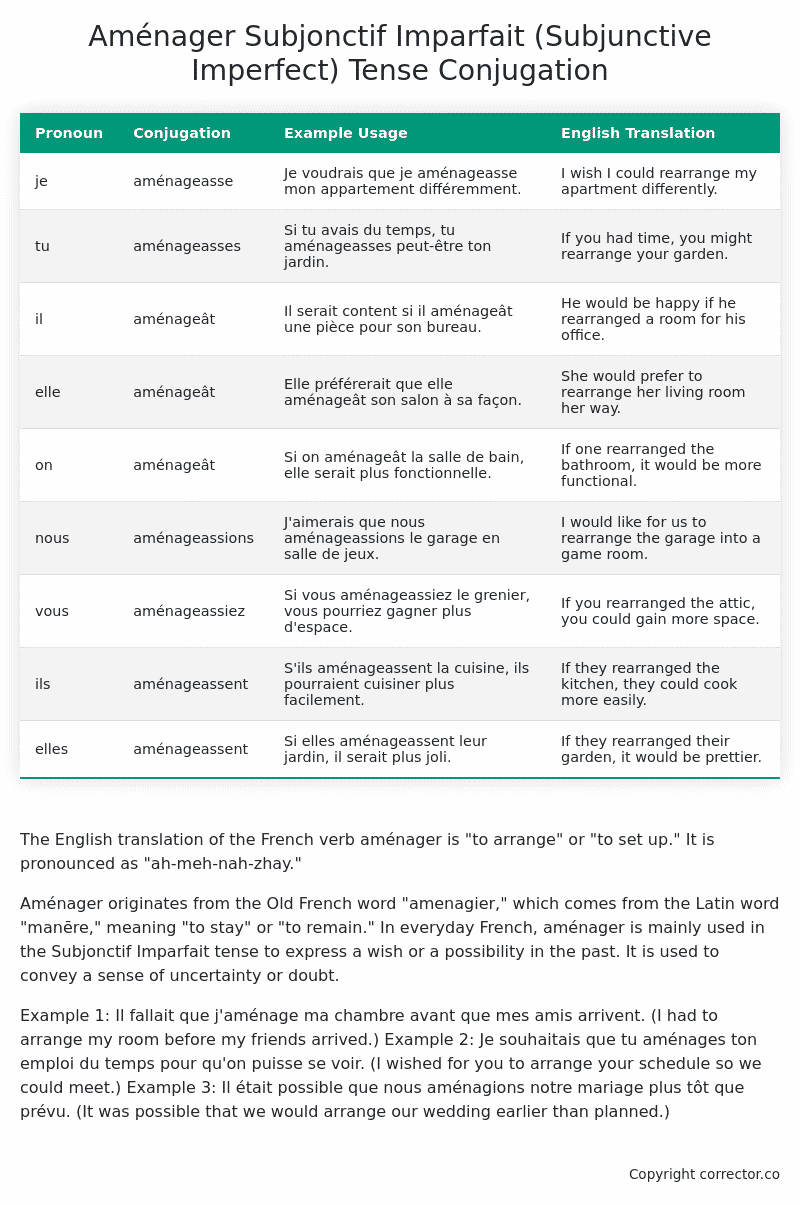Subjonctif Imparfait (Subjunctive Imperfect) Tense Conjugation of the French Verb aménager
Introduction to the verb aménager
The English translation of the French verb aménager is “to arrange” or “to set up.” It is pronounced as “ah-meh-nah-zhay.”
Aménager originates from the Old French word “amenagier,” which comes from the Latin word “manēre,” meaning “to stay” or “to remain.” In everyday French, aménager is mainly used in the Subjonctif Imparfait tense to express a wish or a possibility in the past. It is used to convey a sense of uncertainty or doubt.
Example 1: Il fallait que j’aménage ma chambre avant que mes amis arrivent. (I had to arrange my room before my friends arrived.)
Example 2: Je souhaitais que tu aménages ton emploi du temps pour qu’on puisse se voir. (I wished for you to arrange your schedule so we could meet.)
Example 3: Il était possible que nous aménagions notre mariage plus tôt que prévu. (It was possible that we would arrange our wedding earlier than planned.)
Table of the Subjonctif Imparfait (Subjunctive Imperfect) Tense Conjugation of aménager
| Pronoun | Conjugation | Example Usage | English Translation |
|---|---|---|---|
| je | aménageasse | Je voudrais que je aménageasse mon appartement différemment. | I wish I could rearrange my apartment differently. |
| tu | aménageasses | Si tu avais du temps, tu aménageasses peut-être ton jardin. | If you had time, you might rearrange your garden. |
| il | aménageât | Il serait content si il aménageât une pièce pour son bureau. | He would be happy if he rearranged a room for his office. |
| elle | aménageât | Elle préférerait que elle aménageât son salon à sa façon. | She would prefer to rearrange her living room her way. |
| on | aménageât | Si on aménageât la salle de bain, elle serait plus fonctionnelle. | If one rearranged the bathroom, it would be more functional. |
| nous | aménageassions | J’aimerais que nous aménageassions le garage en salle de jeux. | I would like for us to rearrange the garage into a game room. |
| vous | aménageassiez | Si vous aménageassiez le grenier, vous pourriez gagner plus d’espace. | If you rearranged the attic, you could gain more space. |
| ils | aménageassent | S’ils aménageassent la cuisine, ils pourraient cuisiner plus facilement. | If they rearranged the kitchen, they could cook more easily. |
| elles | aménageassent | Si elles aménageassent leur jardin, il serait plus joli. | If they rearranged their garden, it would be prettier. |
Other Conjugations for Aménager.
Le Present (Present Tense) Conjugation of the French Verb aménager
Imparfait (Imperfect) Tense Conjugation of the French Verb aménager
Passé Simple (Simple Past) Tense Conjugation of the French Verb aménager
Passé Composé (Present Perfect) Tense Conjugation of the French Verb aménager
Futur Simple (Simple Future) Tense Conjugation of the French Verb aménager
Futur Proche (Near Future) Tense Conjugation of the French Verb aménager
Plus-que-parfait (Pluperfect) Tense Conjugation of the French Verb aménager
Passé Antérieur (Past Anterior) Tense Conjugation of the French Verb aménager
Futur Antérieur (Future Anterior) Tense Conjugation of the French Verb aménager
Subjonctif Présent (Subjunctive Present) Tense Conjugation of the French Verb aménager
Subjonctif Passé (Subjunctive Past) Tense Conjugation of the French Verb aménager
Subjonctif Imparfait (Subjunctive Imperfect) Tense Conjugation of the French Verb aménager (this article)
Subjonctif Plus-que-parfait (Subjunctive Pluperfect) Tense Conjugation of the French Verb aménager
Conditionnel Présent (Conditional Present) Tense Conjugation of the French Verb aménager
Conditionnel Passé (Conditional Past) Tense Conjugation of the French Verb aménager
L’impératif Présent (Imperative Present) Tense Conjugation of the French Verb aménager
L’infinitif Présent (Infinitive Present) Tense Conjugation of the French Verb aménager
Struggling with French verbs or the language in general? Why not use our free French Grammar Checker – no registration required!
Get a FREE Download Study Sheet of this Conjugation 🔥
Simply right click the image below, click “save image” and get your free reference for the aménager Subjonctif Imparfait tense conjugation!

Aménager – About the French Subjonctif Imparfait (Subjunctive Imperfect) Tense
Formation
Common Everyday Usage Patterns
Interactions with Other Tenses
Subjonctif Présent
Indicatif Passé Composé
Conditional
Conditional Perfect
Summary
I hope you enjoyed this article on the verb aménager. Still in a learning mood? Check out another TOTALLY random French verb conjugation!


